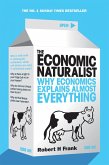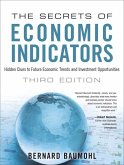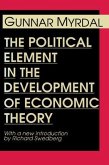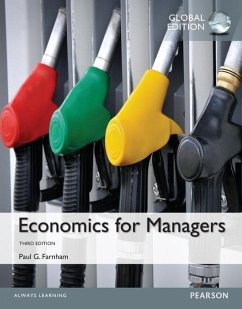Paul Heyne, Peter Boettke, David Prychitko
Economic Way of Thinking, The
Pearson New International Edition
Versandkostenfrei innerhalb Deutschlands
51,99 €
inkl. MwSt.
Versandkostenfrei*
Erscheinen unbestimmt
Melden Sie sich
hier
hier
für den Produktalarm an, um über die Verfügbarkeit des Produkts informiert zu werden.
oder sofort lesen als eBook

26 °P sammeln
Paul Heyne, Peter Boettke, David Prychitko
Economic Way of Thinking, The
Pearson New International Edition
- Broschiertes Buch
For one semester survey courses in general economics
Teach your students how to think like economists.
The Economic Way of Thinking goes beyond explaining the basic principles of micro- and macroeconomic analysis by showing students a method of reasoning that teaches them how to apply these principles as tools. The authors expose students to a method of reasoning that makes them think like an economist through example and application and also shows them how not to think, by exposing errors in popular economic reasoning.
The latest edition has been thoroughly updated with current material. …mehr
Andere Kunden interessierten sich auch für
![The Economic Naturalist The Economic Naturalist]() Robert H FrankThe Economic Naturalist12,99 €
Robert H FrankThe Economic Naturalist12,99 €![The Starfish and the Spider The Starfish and the Spider]() Ori BrafmanThe Starfish and the Spider24,99 €
Ori BrafmanThe Starfish and the Spider24,99 €![The Secrets of Economic Indicators The Secrets of Economic Indicators]() Bernard BaumohlThe Secrets of Economic Indicators47,99 €
Bernard BaumohlThe Secrets of Economic Indicators47,99 €![The Political Element in the Development of Economic Theory The Political Element in the Development of Economic Theory]() Gunnar MyrdalThe Political Element in the Development of Economic Theory63,99 €
Gunnar MyrdalThe Political Element in the Development of Economic Theory63,99 €![Economics for Managers, Global Edition Economics for Managers, Global Edition]() Paul FarnhamEconomics for Managers, Global Edition129,99 €
Paul FarnhamEconomics for Managers, Global Edition129,99 €![Economics for the Common Good Economics for the Common Good]() Jean TiroleEconomics for the Common Good17,99 €
Jean TiroleEconomics for the Common Good17,99 €![The Logic of Collective Action The Logic of Collective Action]() Mancur OlsonThe Logic of Collective Action36,99 €
Mancur OlsonThe Logic of Collective Action36,99 €-
-
-
For one semester survey courses in general economics
Teach your students how to think like economists.
The Economic Way of Thinking goes beyond explaining the basic principles of micro- and macroeconomic analysis by showing students a method of reasoning that teaches them how to apply these principles as tools. The authors expose students to a method of reasoning that makes them think like an economist through example and application and also shows them how not to think, by exposing errors in popular economic reasoning.
The latest edition has been thoroughly updated with current material.
Teach your students how to think like economists.
The Economic Way of Thinking goes beyond explaining the basic principles of micro- and macroeconomic analysis by showing students a method of reasoning that teaches them how to apply these principles as tools. The authors expose students to a method of reasoning that makes them think like an economist through example and application and also shows them how not to think, by exposing errors in popular economic reasoning.
The latest edition has been thoroughly updated with current material.
Produktdetails
- Produktdetails
- Verlag: Prentice Hall
- 13. Aufl.
- Seitenzahl: 432
- Erscheinungstermin: 1. November 2013
- Englisch
- Abmessung: 278mm x 217mm x 20mm
- Gewicht: 904g
- ISBN-13: 9781292026794
- ISBN-10: 1292026790
- Artikelnr.: 39954863
- Herstellerkennzeichnung
- Libri GmbH
- Europaallee 1
- 36244 Bad Hersfeld
- gpsr@libri.de
- Verlag: Prentice Hall
- 13. Aufl.
- Seitenzahl: 432
- Erscheinungstermin: 1. November 2013
- Englisch
- Abmessung: 278mm x 217mm x 20mm
- Gewicht: 904g
- ISBN-13: 9781292026794
- ISBN-10: 1292026790
- Artikelnr.: 39954863
- Herstellerkennzeichnung
- Libri GmbH
- Europaallee 1
- 36244 Bad Hersfeld
- gpsr@libri.de
Chapter 1 The Economic Way of Thinking
Recognizing Order
The Importance of Social Cooperation
How Does It Happen?
An Apparatus of the Mind - The Skill of the Economist
Cooperation Through Mutual Adjustment
Signals
Rules of the Game
Property Rights as Rules of the Game
The Biases of Economic Theory: A Weakness or a Strength?
Biases or Conclusions?
The Skills of the Economist
Questions for Discussion
;
Chapter 2 Efficiency, Exchange and Comparative Advantage
Goods and Bads
The Myth of Material Wealth
Trade Creates Wealth
Is It Worth It? Efficiency and Values
Recognizing Trade-Offs: Comparing Opportunity Costs of Production
The Gains from Specialization and Exchange
Why Specialize?
From Individual Trade to International Trade, and Back Again
Transaction Costs
Incentives to Reduce Transaction Costs: Middlemen
Middlemen Create Information
Markets as Discovery Processes
The Big Picture:; First Thoughts on Economic Growth
Searching for an Explanation
The Evolution of Rules That Encourage Specialization and Exchange
Questions for Discussion
;
Chapter 3 Substitutes Everywhere: The Concept of Demand
On the Notion of "Needs"
Marginal Values
Forks in the Road: Everyday Choices Are Marginal Choices
The Demand Curve
The Law of Demand
Demand and Quantity Demanded
Demand Itself Can Change
Everything Depends on Everything Else
Misperceptions Caused by Inflation
Time Is on Our Side
Price Elasticity of Demand
Thinking About Elasticity
Elasticity and Total Receipts
The Myth of Vertical Demand
What Role Should Demand Play?
Is Money All That Matters? Money Costs, Other Costs, and Economic Calculation
Questions for Discussion
;
Chapter 4 Cost and Choice: The Concept of Supply
Refresher on Opportunity Costs
Costs Are Tied to Actions, Not Things
What Do I Do Now? The Irrelevance of "Sunk Costs"
Producers' Costs as Opportunity Costs
Marginal Opportunity Costs
Costs and Supply
The Supply Curve
Supply Itself Can Change
Marginal and Average Costs
The Cost of a Volunteer Military Force
Price Elasticity of Supply (...)
Recognizing Order
The Importance of Social Cooperation
How Does It Happen?
An Apparatus of the Mind - The Skill of the Economist
Cooperation Through Mutual Adjustment
Signals
Rules of the Game
Property Rights as Rules of the Game
The Biases of Economic Theory: A Weakness or a Strength?
Biases or Conclusions?
The Skills of the Economist
Questions for Discussion
;
Chapter 2 Efficiency, Exchange and Comparative Advantage
Goods and Bads
The Myth of Material Wealth
Trade Creates Wealth
Is It Worth It? Efficiency and Values
Recognizing Trade-Offs: Comparing Opportunity Costs of Production
The Gains from Specialization and Exchange
Why Specialize?
From Individual Trade to International Trade, and Back Again
Transaction Costs
Incentives to Reduce Transaction Costs: Middlemen
Middlemen Create Information
Markets as Discovery Processes
The Big Picture:; First Thoughts on Economic Growth
Searching for an Explanation
The Evolution of Rules That Encourage Specialization and Exchange
Questions for Discussion
;
Chapter 3 Substitutes Everywhere: The Concept of Demand
On the Notion of "Needs"
Marginal Values
Forks in the Road: Everyday Choices Are Marginal Choices
The Demand Curve
The Law of Demand
Demand and Quantity Demanded
Demand Itself Can Change
Everything Depends on Everything Else
Misperceptions Caused by Inflation
Time Is on Our Side
Price Elasticity of Demand
Thinking About Elasticity
Elasticity and Total Receipts
The Myth of Vertical Demand
What Role Should Demand Play?
Is Money All That Matters? Money Costs, Other Costs, and Economic Calculation
Questions for Discussion
;
Chapter 4 Cost and Choice: The Concept of Supply
Refresher on Opportunity Costs
Costs Are Tied to Actions, Not Things
What Do I Do Now? The Irrelevance of "Sunk Costs"
Producers' Costs as Opportunity Costs
Marginal Opportunity Costs
Costs and Supply
The Supply Curve
Supply Itself Can Change
Marginal and Average Costs
The Cost of a Volunteer Military Force
Price Elasticity of Supply (...)
Chapter 1 The Economic Way of Thinking
Recognizing Order
The Importance of Social Cooperation
How Does It Happen?
An Apparatus of the Mind - The Skill of the Economist
Cooperation Through Mutual Adjustment
Signals
Rules of the Game
Property Rights as Rules of the Game
The Biases of Economic Theory: A Weakness or a Strength?
Biases or Conclusions?
The Skills of the Economist
Questions for Discussion
;
Chapter 2 Efficiency, Exchange and Comparative Advantage
Goods and Bads
The Myth of Material Wealth
Trade Creates Wealth
Is It Worth It? Efficiency and Values
Recognizing Trade-Offs: Comparing Opportunity Costs of Production
The Gains from Specialization and Exchange
Why Specialize?
From Individual Trade to International Trade, and Back Again
Transaction Costs
Incentives to Reduce Transaction Costs: Middlemen
Middlemen Create Information
Markets as Discovery Processes
The Big Picture:; First Thoughts on Economic Growth
Searching for an Explanation
The Evolution of Rules That Encourage Specialization and Exchange
Questions for Discussion
;
Chapter 3 Substitutes Everywhere: The Concept of Demand
On the Notion of "Needs"
Marginal Values
Forks in the Road: Everyday Choices Are Marginal Choices
The Demand Curve
The Law of Demand
Demand and Quantity Demanded
Demand Itself Can Change
Everything Depends on Everything Else
Misperceptions Caused by Inflation
Time Is on Our Side
Price Elasticity of Demand
Thinking About Elasticity
Elasticity and Total Receipts
The Myth of Vertical Demand
What Role Should Demand Play?
Is Money All That Matters? Money Costs, Other Costs, and Economic Calculation
Questions for Discussion
;
Chapter 4 Cost and Choice: The Concept of Supply
Refresher on Opportunity Costs
Costs Are Tied to Actions, Not Things
What Do I Do Now? The Irrelevance of "Sunk Costs"
Producers' Costs as Opportunity Costs
Marginal Opportunity Costs
Costs and Supply
The Supply Curve
Supply Itself Can Change
Marginal and Average Costs
The Cost of a Volunteer Military Force
Price Elasticity of Supply (...)
Recognizing Order
The Importance of Social Cooperation
How Does It Happen?
An Apparatus of the Mind - The Skill of the Economist
Cooperation Through Mutual Adjustment
Signals
Rules of the Game
Property Rights as Rules of the Game
The Biases of Economic Theory: A Weakness or a Strength?
Biases or Conclusions?
The Skills of the Economist
Questions for Discussion
;
Chapter 2 Efficiency, Exchange and Comparative Advantage
Goods and Bads
The Myth of Material Wealth
Trade Creates Wealth
Is It Worth It? Efficiency and Values
Recognizing Trade-Offs: Comparing Opportunity Costs of Production
The Gains from Specialization and Exchange
Why Specialize?
From Individual Trade to International Trade, and Back Again
Transaction Costs
Incentives to Reduce Transaction Costs: Middlemen
Middlemen Create Information
Markets as Discovery Processes
The Big Picture:; First Thoughts on Economic Growth
Searching for an Explanation
The Evolution of Rules That Encourage Specialization and Exchange
Questions for Discussion
;
Chapter 3 Substitutes Everywhere: The Concept of Demand
On the Notion of "Needs"
Marginal Values
Forks in the Road: Everyday Choices Are Marginal Choices
The Demand Curve
The Law of Demand
Demand and Quantity Demanded
Demand Itself Can Change
Everything Depends on Everything Else
Misperceptions Caused by Inflation
Time Is on Our Side
Price Elasticity of Demand
Thinking About Elasticity
Elasticity and Total Receipts
The Myth of Vertical Demand
What Role Should Demand Play?
Is Money All That Matters? Money Costs, Other Costs, and Economic Calculation
Questions for Discussion
;
Chapter 4 Cost and Choice: The Concept of Supply
Refresher on Opportunity Costs
Costs Are Tied to Actions, Not Things
What Do I Do Now? The Irrelevance of "Sunk Costs"
Producers' Costs as Opportunity Costs
Marginal Opportunity Costs
Costs and Supply
The Supply Curve
Supply Itself Can Change
Marginal and Average Costs
The Cost of a Volunteer Military Force
Price Elasticity of Supply (...)







